Acclimatize in Namche Bazaar
Explore the Sherpa Capital
Namche Bazaar, frequently called the gateway to the Himalayas, is the appropriate vicinity to acclimatize to the excessive altitude. Nestled at an altitude of 3,440 meters, this colourful city is more than just a pitstop; it’s a cultural hub and a trekkers' paradise.
What to Do in Namche Bazaar:
- Visit the Sherpa Museum: Dive into the wealthy records and traditions of the Sherpa humans. The museum showcases traditional Sherpa clothing, artefacts, and even a gallery of Everest’s finest climbers.
- Hike to Everest View Hotel: Take a short hike to the Everest View Hotel, one of the largest hotels in the global. Enjoy a cup of tea even as gazing at your first clear view of Mount Everest. It’s a moment to probably stay with you forever.
- Stroll Through the Market: Namche Bazaar’s market is bustling with activity. You should purchase souvenirs, and hiking tools, or revel in the vibrant surroundings. It’s an amazing place to interact with locals and fellow trekkers.
Visit the Tengboche Monastery
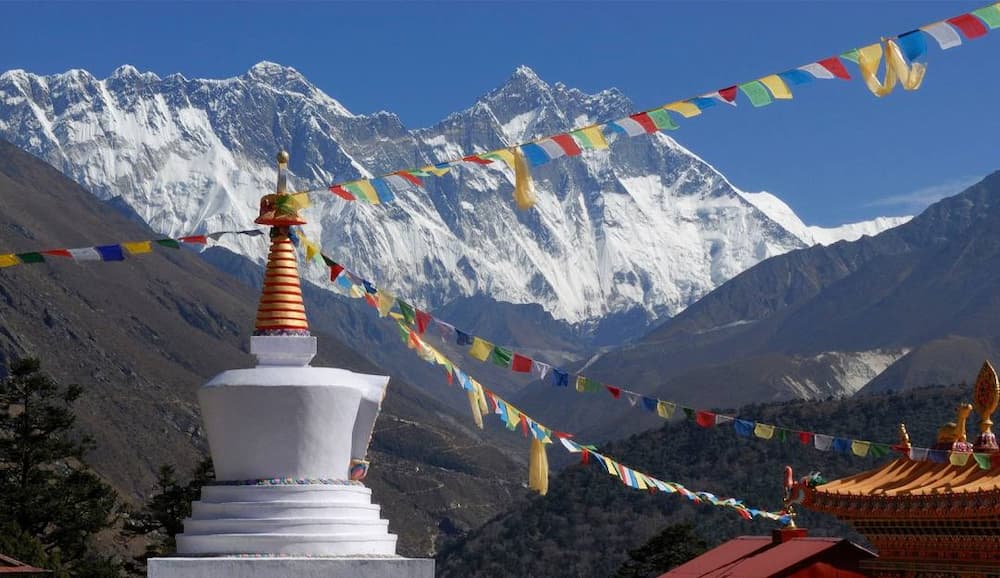
A Spiritual Pause on Your Journey
The Tengboche Monastery, perched at three,867 meters, isn't always just a spiritual web site however an image of spiritual peace in the mountains. This sacred Buddhist pilgrim's site is the most important monastery in the Khumbu region and gives stunning views of Everest, Nuptse, and Ama Dablam.
Why Visit Tengboche Monastery:
- Experience a Monastic Ritual: If you time your visit right, you could witness the priests performing their day-to-day rituals. The sound of chanting, the heady scent of incense, and the serene surroundings make for a deeply moving experience.
- Trek Through the Rhododendron Forest: The trail leading to Tengboche is covered with stunning rhododendron forests. In the spring, the blossoms create a vibrant comparison against the snowy peaks, Making your trek even greater picturesque.
- Enjoy the Panoramic Views: Tengboche gives some of the most breathtaking views on the trek. The sight of Everest towering in the distance, especially for the duration of dawn or sunset, is honestly enchanting.
Interact with Locals in Khumjung Village
Discover the Heart of Sherpa Culture
Khumjung Village, placed at 3,790 meters, is regularly overlooked by trekkers, however, it’s one of the maximum real Sherpa villages in the place. This village is an appropriate region to learn more about the everyday life of the Sherpa humans and their precise traditions.
What Makes Khumjung Special:
- Visit the Khumjung Monastery: This small but huge monastery is assumed to reside a yeti scalp, a mythical creature of the Himalayas. Whether you trust in the fable or no longer, the monastery is worth a visit.
- Tour the Hillary School: Established by Sir Edmund Hillary in 1961, the school is a testament to his deep reference to the Sherpa network. It’s an amazing place to learn about the efforts to enhance education inside the location.
- Experience Sherpa Hospitality: Stay in a neighbourhood teahouse and experience traditional Sherpa dishes like Sherpa stew and yak butter tea. The warmth and hospitality of the Sherpa humans will make you sense proper at home.
Cross the Hillary Suspension Bridge
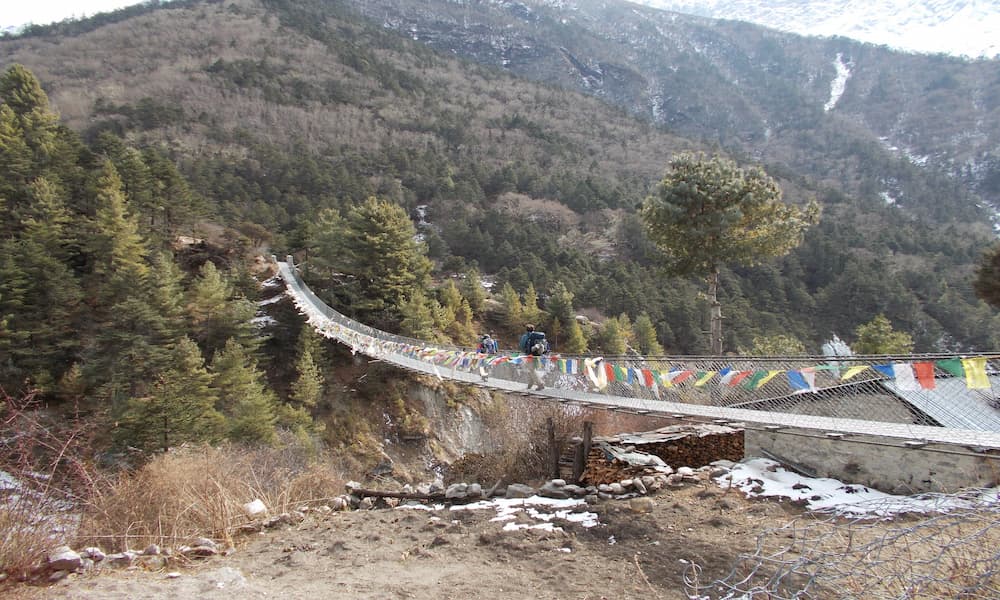
An Iconic Landmark at the Trek
The Hillary Suspension Bridge, named after Sir Edmund Hillary, is one of the most well-known landmarks at the Everest Base Camp trek. Suspended high above the Dudh Koshi River, this bridge is thrilling and awe-inspiring.
Why It’s a Must-Do:
- Feel the Adrenaline: Walking across the swaying bridge is a thrilling revel in. The sound of the river speeding underneath, the prayer flags fluttering within the wind, and the sheer peak make it a moment you’ll never neglect.
- Capture Stunning Photos: The bridge offers a high-quality photo opportunity. The aggregate of the deep gorge, the surrounding greenery, and the remote snow-capped peaks create a great backdrop for your trek recollections.
Enjoy a Rest Day in Dingboche
Recharge in the Heart of the Himalayas
Dingboche, sitting at four,410 meters, is often used as an acclimatization forestall at the trek. This captivating village gives trekkers a threat to relax, get well, and experience the lovely environment.
How to Make the Most of Dingboche:
- Hike to Nagarjun Hill: For people with electricity to spare, a day hike to Nagarjun Hill is fairly encouraged. The hike, though steep, rewards you with panoramic views of Lobuche East, Lobuche West, Kangtega, Ama Dablam, and Makalu.
- Explore the Village: Take a leisurely walk through Dingboche, travelling to neighbourhood bakeries, teahouses, and the small but stunning Stupa. The village is surrounded by stone partitions that shield the vegetation from cold winds, including its old-fashioned attraction.
- Connect with Fellow Trekkers: Dingboche is a popular spot for trekkers to rest, so you’ll have lots of opportunities to share memories and experiences with others on the same adventure.
Visit the Memorials at Thukla
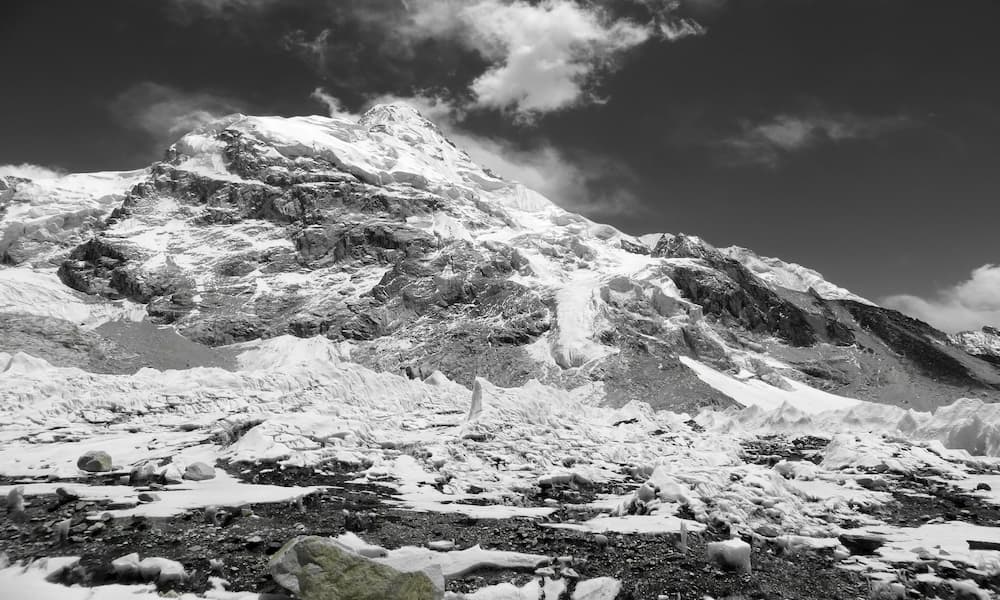
Pay Your Respect to Fallen Climbers
Thukla cruss, at an altitude of 4830 meters, isn't always just a physical task but an emotional one as properly. The skip is domestic to several memorials dedicated to climbers who lost their lives on Everest.
Why Thukla Pass is Significant:
- Reflect on the History of Everest: The memorials, decorated with prayer flags, plaques, and inscriptions, serve as a poignant reminder of the dangers worried in high-altitude mountain climbing. It’s a place for quiet reflection and to honour the bravery of those who have perished.
- Experience the Serenity: Despite the sombre nature of the site, the bypass gives a peaceful surrounding. The surrounding mountains and the tremendous open areas offer a second of solitude and introspection.
Reach Everest Base Camp
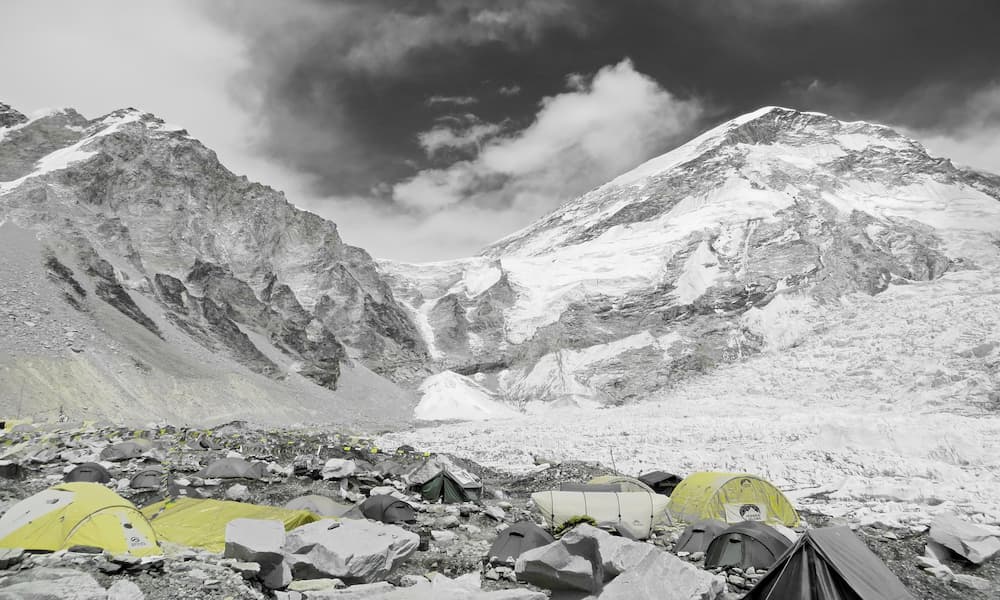
The Ultimate Goal of Your Trek
Finally, the instant you’ve been anticipating—accomplishing Everest Base Camp! Located at 5,364 meters, the base camp is the starting point for climbers attempting to summit Everest. For trekkers, it’s the result of days of tough paintings, dedication, and journey.
What to Expect at Everest Base Camp:
- Feel the Accomplishment: Standing at Everest Base Camp is an emotional and exhilarating experience. You’re surrounded with the aid of towering peaks, with the Khumbu Icefall in view. Take a moment to soak it all in—you’ve earned it.
- Take Plenty of Photos: This is the region where you’ll want to seize each second. The base camp is marked with prayer flags, rocks, and symptoms left using previous trekkers. Don’t neglect to snap a photograph with the enduring “Everest Base Camp” signal.
- Reflect on Your Journey: As you stand at the bottom of the arena’s maximum mountain, take a second to reflect on your journey. The challenges you’ve faced, the human beings you’ve met, and the breathtaking landscapes you’ve traversed all come together at this one amazing spot.
Trek to Kala Patthar for a Panoramic View of Everest
.jpg)
A Sunrise You’ll Never Forget
While achieving Everest Base Camp is a high-quality success, the first-class view of Everest is from Kala Patthar. Located at 5,545 meters, this viewpoint gives a 360-degree panorama of Everest and the encompassing peaks.
Why Kala Patthar is a Must-Do:
- Catch the Sunrise: The nice time to hike Kala Patthar is early in the morning to trap the sunrise. As the solar rises, it bathes Everest in a golden glow, growing a magical Scene that’s worth the early take-heed call.
- Experience the Best View of Everest: From Kala Patthar, you get a near-up view of Everest, from the side of other peaks like Lhotse, Nuptse, Ama dablam island peak and Pumori. It’s an appropriate spot for photography and virtually soaking inside the grandeur of the Himalayas.
- Challenge Yourself: The hike to Kala Patthar is tough, particularly at excessive altitude, however, the praise is more than well worth the attempt. The sense of achievement, blended with the breathtaking perspectives, makes it one of the highlights of the trek.
Stay in a Teahouse
Experience Authentic Himalayan Hospitality
One of the specific components of the Everest Base Camp trek is staying in traditional teahouses. These simple accommodations, run with the aid of nearby families, provide trekkers with a relaxed region to rest, devour, and socialize.
Why Teahouses are Special:
- Warm Sherpa Hospitality:Teahouses are regularly run by local Sherpa families who are recognized for their warm temperature and hospitality. After an extended day of hiking, there’s nothing higher than being greeted with a friendly smile and a warm cup of tea. You’ll experience such as you’re part of a circle of relatives, even though just for a night.
- Authentic Local Experience: Staying in a teahouse offers you a glimpse into the everyday lifestyles of the Sherpa human beings. You’ll get to strive for local ingredients like dal bhat (a traditional Nepali dish of lentil soup with rice), momos (dumplings), and yak butter tea. These foods are hearty and best for refuelling after a hard day on the trail.
- Simple Comforts: While teahouses are fundamental, they offer all of the necessities you want—a mattress, a warm blanket, and a hot meal. Some have shared showers (though warm water may come at an extra fee) and a commonplace area with a wooden-burning range where trekkers acquire inside the evenings to warm up and share memories.
- Cultural Exchange: Teahouses also are splendid places to satisfy other trekkers from around the world. The communal ecosystem encourages interplay, and also you’ll regularly find yourself swapping trekking memories, travel pointers, and life memories with fellow adventurers.
- Incredible Views: Many teahouses are located in lovely settings, with views of the surrounding mountains proper outdoor your window. Waking as much as dawn over the Himalayas or falling asleep underneath a sky full of stars is an experience you gained’t effortlessly forgotten about.
Explore the Khumbu Glacier
.jpg)
A Walk on Ancient Ice
The Khumbu Glacier, positioned close to Everest Base Camp, is one of the largest glaciers in the international. Trekking along this huge river of ice is a surreal experience that brings you even closer to the heart of the Himalayas.
Why the Khumbu Glacier is a Must-See:
- Marvel on the Ice Formations: The glacier is filled with captivating ice formations, which include deep crevasses, seracs (ice towers), and moraine (rock debris carried through the glacier). The panorama is continuously converting, making every visit precise.
- Feel the Power of Nature: Walking along the Khumbu Glacier, you may truly appreciate the energy of nature. The glacier has been carving its way via the mountains for thousands of years, shaping the landscape of the Khumbu location.
- Get Up Close with the Khumbu Icefall: The Khumbu Icefall, positioned at the pinnacle of the glacier, is one of the maximum risky sections of the Everest climb. While trekkers don’t cross the icefall, you may get a near view from the bottom camp. Watching the climbers navigate this treacherous phase is both awe-inspiring and humbling.
Discover the Hidden Gem of Gokyo Lakes
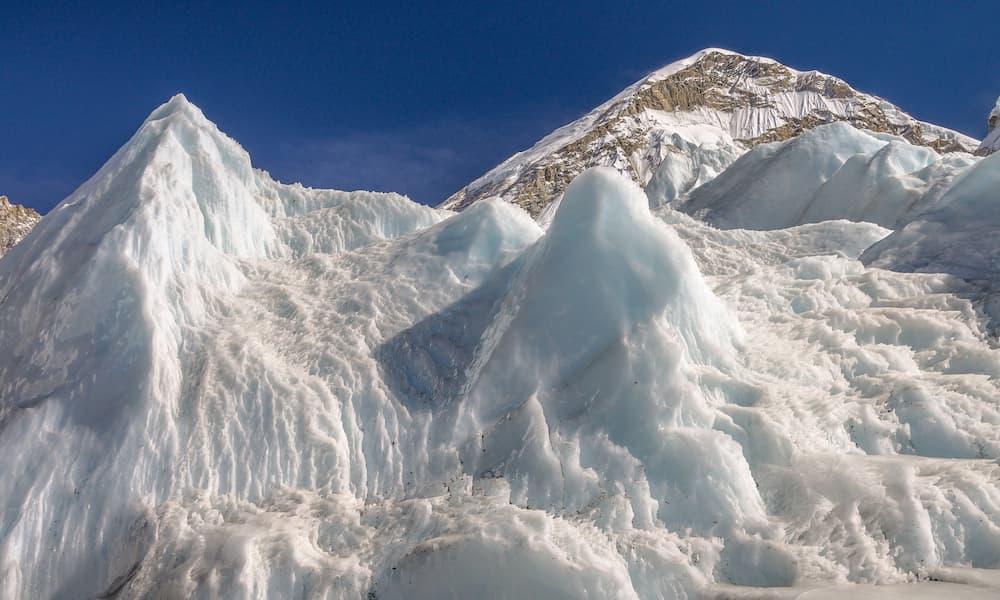
A Serene Detour Worth Taking
If you've got greater time and strength, bear in mind adding the Gokyo Lakes trek to your itinerary. These excessive-altitude lakes, placed at about 4,700 meters, provide a number of the maximum stunning scenery within the Everest location.
Why You Should Visit Gokyo Lakes:
- See the Turquoise Waters: The Gokyo Lakes are acknowledged for their striking turquoise shade, which contrasts beautifully with the encircling snow-protected peaks. The lakes are sacred to both Hindus and Buddhists, adding a religious size to their natural beauty.
- Climb Gokyo Ri: From the village of Gokyo, you can hike up Gokyo Ri, a height that gives panoramic perspectives of Everest,Lhotse, Makalu, and Cho Oyu—four of the world’s largest mountains. The view from the top is arguably one of the excellent inside the complete vicinity.
- Escape the Crowds: The Gokyo Lakes trek is less crowded than the main Everest Base Camp trail, making it a more non-violent and serene revel. It’s a perfect alternative for trekkers looking to discover a quieter part of the Everest area.
Everest Base Camp Trek itinerary
Day 1:Arrival in Kathmandu
Day 2:Kathmandu – Lukla [2,840m] by flight, 35 mins – Trek from Lukla to Phakding, 3-4 hrs trek
Day 3:Trek from Phakding – Namche Bazaar 6-8 hrs
Day 4:Namche Bazaar: Acclimatization and Exploration day
Day 5:Trek from Namche Bazaar – Tengboche 5-6 hrs
Day 6:Trek from Tengboche - Dingboche 5-6 hrs
Day 7:Dingboche: Acclimatization and Exploration day
Day 8:Trek from Dingboche – Lobuche 4-5 hrs
Day 9:Trek from Lobuche – Gorakshep [5,160m] – Everest Base Camp [5,364m] – Gorakshep, 7-8 hrs
Day 10:Trek from Gorakshep – Kalapatthar [5,545m] – Pheriche [4,280m] 7-8 hrs
Day 11:Trek from Pheriche – Namche Bazaar 8-9 hrs
Day 12:Trek from Namche Bazaar – Lukla 7-8 hrs
Day 13:Flight from Lukla – to Kathmandu 35 min flight.
Day 14:Departure
Capture the Night Sky
.jpg)
A Stargazer’s Paradise
The Everest vicinity is one of the most satisfactory locations in the world for stargazing. With little to no light pollutants and clear skies at high altitudes, the night sky comes alive with limitless stars, planets, and even the Milky Way.
Why Stargazing is a Must-Do:
- See the Milky Way: On a clear night, you can see the Milky Way stretching throughout the sky in all its glory. The sight of this galactic surprise, set against the silhouette of the Himalayas, is not anything brief or magical.
- Try Night Photography: If you’re into pictures, that is your chance to capture lovely pictures of the night sky. Even in case you’re now not a professional, the sheer beauty of the starlit sky over the mountains Is well worth staying up overdue for.
- Reflect Under the Stars: There’s something highly peaceful about sitting beneath a blanket of stars in the Himalayas. It’s a suitable time to reflect on your adventure, connect to nature, and enjoy a moment of solitude in one of the most foreign places on Earth.
Take a Side Trip to Gokyo Lakes
Explore a Hidden Gem of the Himalayas
For people with greater time and energy an aspect experience of the Gokyo Lakes is an unforgettable detour. Located off the primary EBC trail, the Gokyo Lakes are a chain of high-altitude lakes which can be famed for their lovely turquoise colouration and the encompassing panoramic views.
Highlights of the Gokyo Lakes:
- Pristine Beauty: The Gokyo Lakes are a number of the very best freshwater lakes in the global, sitting at an altitude of around 4700 to 5000 meters. The deep blue and green colourations of the lakes in opposition to the backdrop of snowy peaks create a photograph-ideal scene.
- Gokyo Ri Viewpoint: For excellent perspectives, hike up to Gokyo Ri, a standpoint at five,357 meters. From right here, you’ll get a wide-ranging 360-degree panorama of the Everest range, including views of Everest itself, as well as Lhotse, Makalu, and Cho Oyu.
- Tranquil Atmosphere: The Gokyo Lake is much less crowded than the main EBC path, providing extra peaceful and far-flung trekking enjoyment. The tranquillity of the lakes and the surrounding mountains is best for those searching for solitude and a deeper reference to nature.
Visit the Pangboche Monastery
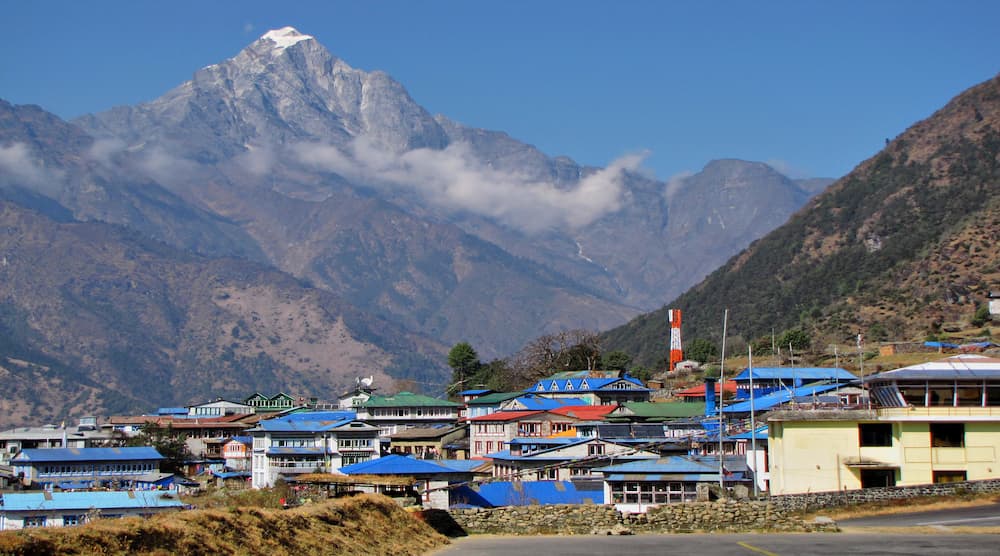
A Hidden Gem with a Rich History
Pangboche Monastery, located at 3,985 meters, is one of the oldest monasteries within the Khumbu vicinity. It’s less visited than Tengboche however gives a quieter, greater intimate enjoyment.
Why Pangboche Monastery is Worth the Visit:
- Explore a Historical Site: Pangboche Monastery is stated to be the oldest within the Khumbu place, with a history dating lower back over 300 years. It’s an area steeped in records, with historic manuscripts, statues, and relics that tell the tale of the region’s spiritual background.
- Enjoy the Tranquility: Unlike the extra popular monasteries, Pangboche is regularly quiet and peaceful. It’s a great spot to sit in silence, meditate, or experience the serene environment.
- Meet the Head Lama: If you’re lucky, you might have the threat to meet the pinnacle lama of the monastery, which is especially reputable inside the Sherpa network. Receiving a blessing
Take a Helicopter Tour
.jpg)
See the Himalayas from Above
If you’re seeking to splurge on an as soon as-in-a-lifetime enjoy, do not forget to take an EBC helicopter excursion over the Everest vicinity. This is one of the best ways to peer the vastness of the Himalayas in all their glory.
Why a Helicopter Tour is Worth It:
- Unmatched Views: A helicopter excursion offers you a hen’s eye view of the Everest vicinity, such as the towering peaks, deep valleys, and winding rivers. It’s a unique angle from what you notice on the ground.
- Reach Remote Locations: The helicopter can take you to locations that are otherwise inaccessible, like the pristine Gokyo Lakes or even Everest Base Camp in case you’re quick on time.
- Celebrate in Style: Many trekkers select to take a helicopter ride lower back to Lukla after finishing the Everest Base Camp trek. It’s a luxurious and exhilarating manner to rejoice in your success at the same time as enjoying one final view of the mountains.
Conclusion
The Everest Base Camp trek is more than just a bodily mission; it’s a deeply enriching revel that offers a wealth of unforgettable moments. From the bustling streets of Namche Bazaar to the serene shorelines of the Gokyo Lakes, each step of the trek brings you towards the heart of the Himalayas and the spirit of the journey.
Whether it’s the thrill of crossing a suspension bridge, the peace of a Puja rite, or the easy pleasure of sharing a meal with fellow trekkers, those stories are what make the trek simply special. So, as you put together in your journey to Everest Base Camp, recall to embrace each moment, connect to the humans and places you come across, and enjoy the beauty of one of the most iconic treks in the global. Safe travels, Contact us for more inquiries related to this blog at Eternal Himalaya


.jpg)




.jpg)
.jpg)

.jpg)

.jpg)
